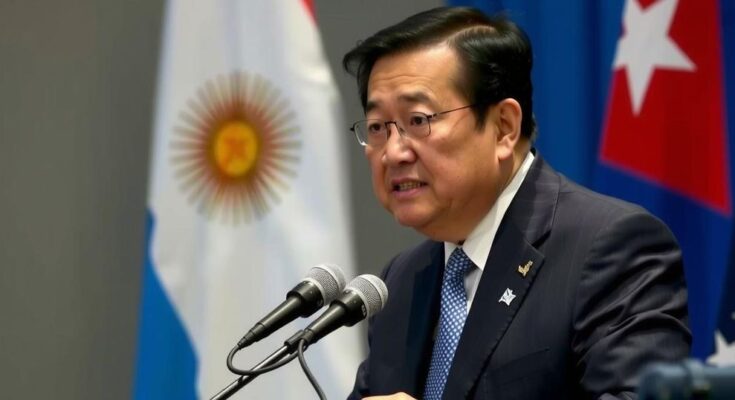President Javier Milei of Argentina has fired Foreign Minister Diana Mondino after Argentina supported a UN resolution to lift the US embargo on Cuba. The vote marked a shift away from typical Argentine opposition to the embargo and saw Milei appoint Gerardo Werthein as her successor. The resignation raises questions about Argentina’s foreign policy direction and diplomatic relations with both the US and Israel.
President Javier Milei of Argentina has dismissed Foreign Minister Diana Mondino following the country’s vote supporting a UN resolution to lift the United States embargo on Cuba, a measure in place since 1962. This action marks a notable departure from Argentina’s longstanding positions, as it aligns with the votes of 186 other UN member states, while only the United States and Israel opposed the resolution. In a statement issued by the presidency, it was announced that Mr. Gerardo Werthein would assume the role of Foreign Minister, succeeding Mondino. Werthein previously served as Argentina’s ambassador to the United States. The immediate aftermath of Mondino’s dismissal saw President Milei sharing a post from a lawmaker expressing pride in a government that does not support authoritarian regimes, further emphasizing the administration’s stance on foreign relations. Traditionally, Argentina has voted against the embargo on Cuba, and this shift has raised eyebrows within diplomatic circles, noting the awkwardness of opposing the US and Israel. Reports from local media indicate that the votes from Cuba and its allies may be strategically necessary for Argentina regarding future resolutions tied to its claim of sovereignty over the Falkland Islands, a matter of significant national interest.
The United States imposed an embargo on Cuba in 1962, aimed at pressuring the communist regime. Over the years, there have been ongoing debates regarding the efficacy and ethical implications of the embargo. In recent years, many countries have voted to lift the embargo at the United Nations, seeking to normalize relations with Cuba. Argentina has historically aligned with the majority of UN member states against the embargo, making President Milei’s recent decision to vote in favor of lifting it particularly noteworthy. This shift may not only affect Argentina’s relationship with Cuba but also its diplomatic ties with the US and Israel, both of whom are among its allies.
In summary, President Javier Milei’s decision to dismiss Foreign Minister Diana Mondino following Argentina’s UN vote to lift the US embargo on Cuba signifies a significant shift in Argentina’s foreign policy. This development highlights the complexities of international alliances and domestic policy, particularly in the context of Argentina’s claim on the Falkland Islands. The appointment of Gerardo Werthein may indicate a recalibration of Argentina’s approach to foreign relations moving forward.
Original Source: www.france24.com




